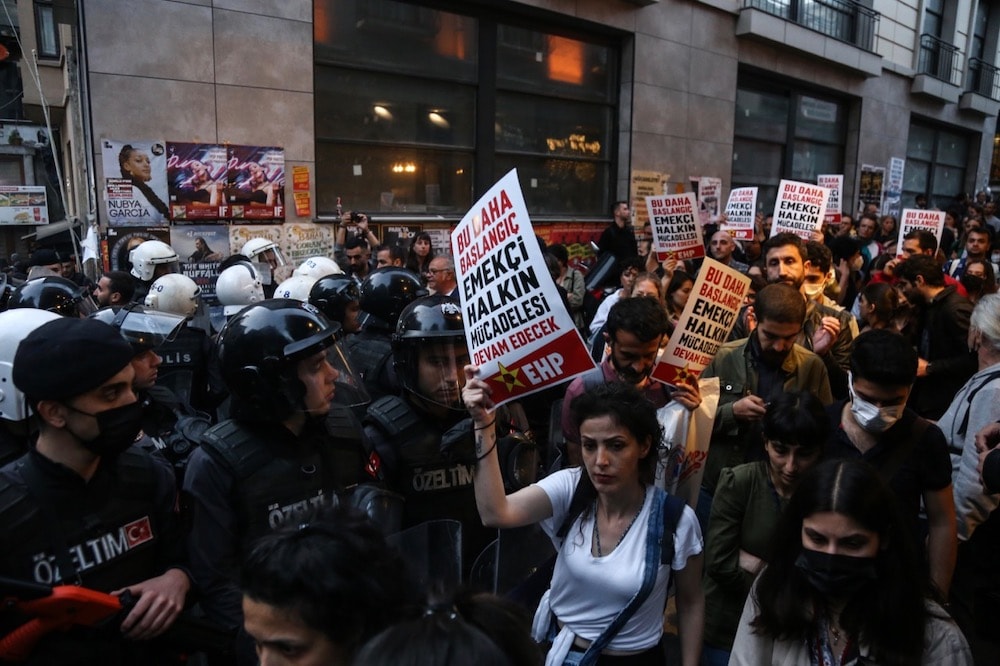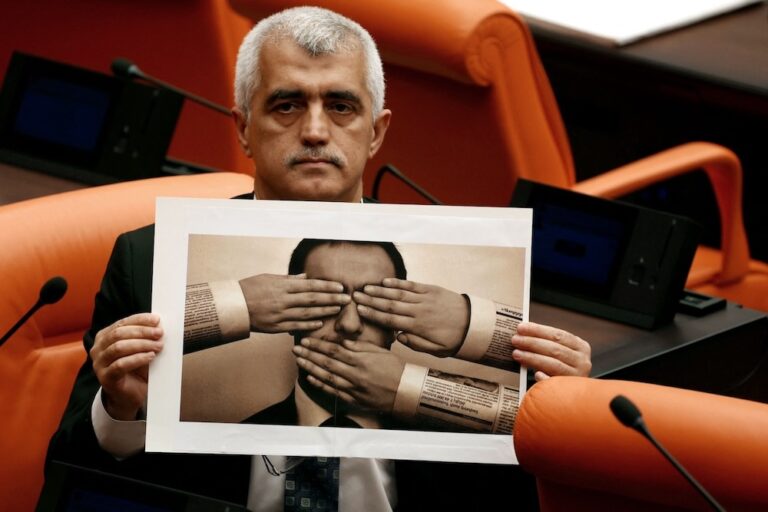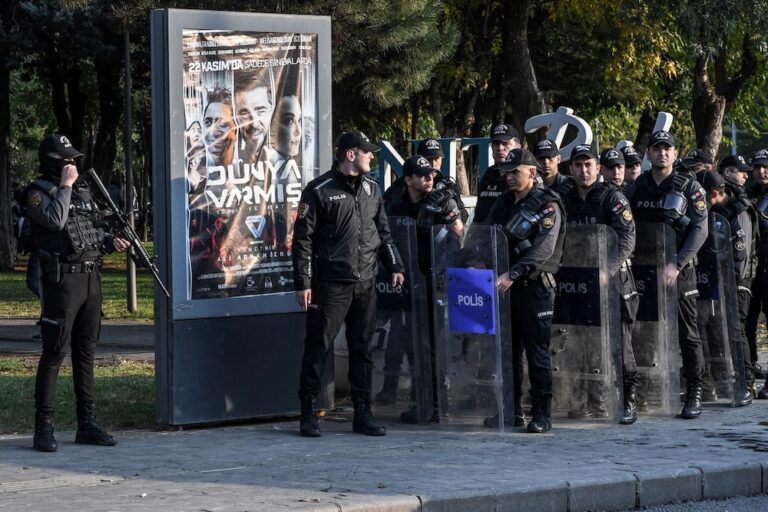“The judicial process has become deformed under political influence and turned into an act of deprivation of liberty by abuse of power” - Osman Kavala
This statement was originally published on expressioninterrupted.com on 27 April 2022.
The court decided to sentence jailed businessperson Osman Kavala to aggravated life imprisonment on the charge of “attempting to overthrow the government,” and 7 co-defendants to 18 years each in prison for assisting the offense of “attempting to overthrow the government”
CANSU PİŞKİN, İSTANBUL
The final hearing in the Gezi protests-15 July 2006 coup attempt trial, where 17 defendants, including jailed businessperson Osman Kavala, were prosecuted took place on 22 and 25 April 2022 at the İstanbul 13th High Criminal Court. Announcing its decision at the end of the hearing, the court handed down aggravated life imprisonment to Kavala, while sentencing Mücella Yapıcı, Can Atalay, Tayfun Kahraman, Çiğdem Mater, Ali Hakan Altınay, Mine Özerden and Yiğit Ali Ekmekçi to 18 years each in prison and ordered their arrest.
The hearing took place in the courtroom of the İstanbul 27th High Criminal Court due to the large number of defendants, lawyers and observers. Defendants Mücella Yapıcı, Can Atalay, Tayfun Kahraman, Çiğdem Mater, Ali Hakan Altınay, Mine Özerden, Yiğit Ali Ekmekçi and their lawyers were in attendance. Osman Kavala, the only jailed defendant in the case and held in pre-trial detention for four and a half years, participated in the hearing from prison via the judicial video-conferencing network SEGBİS.
P24 monitored the hearing. The observers in the courtroom included MPs from the Peoples’ Democratic Party (HDP), the Workers’ Party of Turkey (TİP) and the Republican People’s Party (CHP).
“The court aims to adjudicate the case quickly”
At the hearing held on 22 April 2022, the defendants presented their defense statements in response to the prosecutor’s final opinion, and asked the court to acquit them on the grounds that the prosecutor’s final opinion was not based on concrete evidence and findings. The defendants noted that the transcriptions of phone records cited in the indictment were illegally obtained and that the prosecutors and judges who had ordered wiretapping were prosecuted and detained as part of an investigation into the FETÖ/PDY terrorist organization. Stressing that the Gezi trial was filed solely on political motivations, the defendants argued that the Gezi Park protests, a spontaneous social movement in its essence, could not be considered an offense within the framework of constitutional rights.
Osman Kavala addressed the court from the prison via SEGBİS and said, “The judicial process has become deformed under political influence and turned into an act of deprivation of liberty by abuse of power.” Kavala argued that the court aimed to adjudicate the case quickly after the Committee of Ministers of the Council of Europe decided to refer to the European Court of Human Rights (ECtHR) the question whether Turkey has failed to abide by the ECtHR decision in his case by refusing to immediately release Kavala.
The full text of Kavala’s defense statement can be accessed.
After the defense statements of the defendants in response to the prosecutor’s final opinion were completed, the court adjourned the trial until 25 April 2022 for the lawyers’ statements.
“The law has been instrumentalized”
Presenting their defense statements in response to the prosecutor’s final opinion on 25 April 2022, the lawyers for the defendants argued that both the indictment and the prosecutor’s final opinion were based on assumptions and the accusations were ungrounded. They further condemned the shortcomings and deficiencies in the trial conduct, pointing out that the prosecution failed to collect new evidence while the court refused to question the defendants and hear witnesses in the retrial process.
Mine Özerden’s lawyer Tuğçe Duygu Köksal said, “The prosecutor’s final opinion intends to criminalize civil society. The alleged acts of assistance in respect of the client all concern the use of her rights. The material and non-material elements of the crime do not exist,” requesting the court acquit Özerden.
In her statement, Yiğit Ali Ekmekçi’s lawyer Emel Ataktürk said, “This trial has been turned into a political trial to silence all rights defenders on the basis of their advocacy; the law has been instrumentalized. There is no concrete evidence linked with the act of overthrowing the government.” The court panel was checking their phones during Ataktürk’s statement, at which point an observer complained, “Judges and prosecutors, please stop checking your phones; please listen.”
“We are experiencing the repetition of the repetitions”
Lawyer Fikret İlkiz, representing Mücella Yapıcı, Can Atalay and Tayfun Kahraman, stated that there was no progress in the file. “The prosecutor’s second final opinion on the case is the same as the prosecutor’s first final opinion. We are experiencing the repetition of the repetitions,” İlkiz asserted, “At the end of the trial overseen by the İstanbul 30th High Criminal Court, it was stated that Osman Kavala was not the financier of Gezi. Neither are my clients; nor could they ever be, since they don’t have a dime to their name. The court ruled for their acquittal because there was no crime, not because there was no evidence.”
Lawyer Evren İşler, also representing Yapıcı, Atalay and Kahraman, stated that judge Murat Bircan applied to be an MP candidate for the Justice and Development Party (AKP) in Samsun province in the general elections of 2018. In her statement, İşler referenced a news article published by the local website Bafra55, which quoted Bircan as saying, “We need a strong leader for a strong country. That strong leader is President Recep Tayyip Erdoğan.” İşler commented, “In this case, Erdoğan is cited as the first complainant. Does it really take any instructions? The member judge already loves him and trusts his leadership.”
Addressing the court next, Osman Kavala’s lawyer Köksal Bayraktar said, “A judge whose position is clearly apparent should no longer be in the jurisdiction. The court panel should recuse themselves since their impartiality is in question.”
Announcing an interim decision, the court rejected the requests for the recusal of the judges on the grounds that it was “aimed at prolonging the trial.”
Deniz Tolga Aytöre, a lawyer for Kavala, denounced the court’s reasoning for rejecting the requests for their recusal. “With respect to our request for you to recuse yourselves from the case, you said, it was ‘aimed at prolonging the case.’ Could the lawyers of a person held in pre-trial detention for four and a half years have such an aim of prolonging the trial?” asked Tolga Aytöre, “This panel cannot decide on that. If so, it would be a poor decision from the get-go. There was no trial here. You didn’t even ask a single question to Osman Kavala. Even if you ask, ‘Did you go to the Gezi Park,’ it would suffice. You proceed to render a decision with exceptional haste. You could at least bring the phone records, your sole evidence, to the courtroom, and ask, ‘Are these the voices of the defendants?’ You insist on using these evidence, because you don’t have any other evidence. There is no crime in the conversations in the said phone records. There is no legal basis for the prosecutor’s final opinion. It would be breaking the law if you decided in line with the prosecutor’s final opinion.”
İlkan Koyuncu, one of Kavala’s lawyers, said, “Osman Kavala was detained twice, released twice and questioned twice regarding 15 July. Not a soul has asked where Kavala was on 15 July. The crime of espionage is so clear; its conditions are apparent; they either occur or they don’t. We thought, how would they detain him without these; but the indictment cited civil society activities as espionage activities.”
“An act of assassination”
Following the statements of the lawyers, the court asked the defendants for their final remarks, upon which Hasan Altınay and Yiğit Ali Ekmekçi requested their acquittal.
Mücella Yapıcı: “I don’t think I have a last remark. I am a professional of 50 years. I have endeavored to be as intellectual as I could. I have never supported violence. I have practiced my profession with honour for the public good. To date, I have never let any of my children have ill-gotten food; I have never committed theft, misdeed or corruption. I have used my profession in line with [the ethics of] my profession. I am proud of my life. I hope you will experience the same sense of pride when you are my age. The judgment is yours.”
Çiğdem Mater: “I refuse to be prosecuted as a putschist. I expected that murderers of the young people during the protests would be sought after; but instead, this case was filed. You cannot give back the 4,5 years you have stolen from Osman Kavala’s life. I reject all accusations, and demand my immediate acquittal.”
Mine Özerden: “I hope the executive tutelage over the judiciary will end and the power of the law will prevail, and I demand my acquittal.”
Can Atalay: “We did not infringe upon what is not rightfully ours; we were not unjust to others. We did not exploit the state for our own interests; we did not seize the power of the state and make our supporters rich. We did not commit any crimes. We have practiced law, architecture, urban planning. This is not a trial. If the problem is claiming the Gezi resistance, we do. This is not an end. This is a beginning; long live the struggle.”
Tayfun Kahraman: “We are where the words fail. Here, a trial is being held for a non-existing crime. Gezi was successful, because it was kept as a park. This is perhaps the only success we have achieved in İstanbul. We are on trial for opposing to crimes against urban nature. You will make a conscientious decision. We’d like you to reject this trial process, conducted through instructions, and close this case.”
Osman Kavala: “It is unlawful to demand aggravated life imprisonment for me on uncorroborated evidence when none of the evidence admitted against me after the European Court of Human Rights found violations linked me to the imputed crime and created a reasonable suspicion. Just like the charges in the second indictment, this is an act of assassination through the judiciary.”
The judgment and the dissenting opinion
Announcing its decision after the last remarks, the court ruled to sentence Osman Kavala to aggravated life imprisonment on the charge of “attempting to overthrow the government” under Article 312 of the Turkish Penal Code (TCK), and acquit and release him of the charge of “espionage” due to the lack of evidence.
Defendants Mücella Yapıcı, Çiğdem Mater, Ali Hakan Altınay, Mine Özerden, Can Atalay, Tayfun Kahraman and Yiğit Ali Ekmekçi were sentenced to 18 years each in prison for assisting the offense of “attempting to overthrow the government.” In addition the court ruled to imprison all seven defendants on the grounds of “the level of the punishment” and that “the imposition of judicial control measures would fail to provide the advantage expected of detention.”
The court also ruled to separate the files against Can Dündar, Ayşe Pınar Alabora, Henry Jack Barkey, Gökçe Yılmaz, Handan Meltem Arıkan, Hanzade Hikmet Germiyanoğlu, Memet Ali Alabora, Yiğit Aksakoğlu and İnanç Ekmekçi, who resided abroad. The decision was taken by a majority, with a member judge filing a dissenting opinion.
In their dissenting opinion, the judge argued that the court should have acquitted all defendants and released Kavala on the grounds that the transcriptions of phone records held as evidence in the indictment were “illegal and unlawful,” and hence constituted “forbidden evidence,” that even if one were to assume otherwise, “the phone records alone are not sufficient to convict the defendants of the alleged crimes,” and that “there were no other concrete, conclusive and convincing evidence, devoid of all suspicion, that is sufficient to sentence the defendants on the alleged crimes.”
Case background
At the end of the final hearing of the Gezi trial held on 18 February 2020, the İstanbul 30th High Criminal Court acquitted Osman Kavala, Mücella Yapıcı, Can Atalay, Tayfun Kahraman, Ali Hakan Altınay, Yiğit Aksakoğlu, Yiğit Ali Ekmekçi, Çiğdem Mater Utku and Mine Özerden of all charges and ordered Kavala’s release.
The files against the defendants who lived abroad – Can Dündar, Memet Ali Alabora, Ayşe Pınar Öğün, Gökçe Tüylüoğlu, Handan Meltem Arıkan, Hanzade Hikmet Germiyanoğlu and İnanç Ekmekçi – were separated. However, several hours after he was acquitted, Kavala was re-arrested on the same day on the charges of “coup” and “espionage” in connection with the 15 July coup attempt.
In January 2020, a regional court of justice overturned the acquittals of nine defendants in the Gezi Park trial and remanded the case to the İstanbul 30th High Criminal Court for a retrial. In February 2021, the competent court ruled to merge the case in which Kavala and Henri Barkey, a US academic, were prosecuted for “attempting to overthrow the constitutional order” and “espionage” with the Gezi Park trial. In April 2021, the İstanbul 30th High Criminal Court decided to merge the files against the defendants who lived abroad with the main trial.
In the Gezi Park trial, 16 defendants were charged with “attempting to overthrow the government,” “damaging property,” “possession or exchange of hazardous substances without permission,” “damaging places of worship and cemeteries,” “qualified robbery,” “qualified injury,” and “violating Law on the Conservation of Cultural and Natural Property.” The prosecution was seeking aggravated life imprisonment for all.
In the Çarşı trial, in which 35 members of the Beşiktaş football fan group “Çarşı” were prosecuted for “attempting to overthrow the government,” “violating Law No. 2911 on Meetings and Demonstrations,” “membership in an organization established to commit offenses,” and “preventing public officials from performing their duty” in connection with the Gezi Park protests of 2013, on the other hand, the İstanbul 13th High Criminal Court ruled on 29 December 2015 to acquit all defendants.
In April 2021, the 16th Criminal Chamber of the Supreme Court of Appeals unanimously overturned the acquittals of 35 defendants in the Çarşı trial, citing, in part, the fact that the trial court failed to consider merging the case with the Gezi trial, overseen by the İstanbul 30th High Criminal Court.
On 28 July 2021, Mahmut Başbuğ, the judge presiding over the İstanbul 30th High Criminal Court panel overseeing the Gezi trial, was temporarily appointed to the İstanbul 13th High Criminal Court panel, to which he had previously asked whether they would assent to merging the two case files. During the hearing presided over by Judge Başbuğ, the İstanbul 13th High Criminal Court assented to merging the files, and accordingly, the trial would resume at the İstanbul 13th High Criminal Court.
On 2 February 2022, the Committee of Ministers, the statutory decision-making body of the Council of Europe, decided by a majority to refer to the European Court of Human Rights the question whether Turkey had failed to fulfill its obligation to abide by the ECtHR’s judgment in the Kavala case, and hence, formally initiated the infringement proceedings against Turkey.
At the hearing held on 21 February 2021, the 13th High Criminal Court ruled to separate the merged Çarşı and Gezi retrials.
On 4 March 2022, the trial prosecutor Edip Şahiner submitted their final opinion on the case, asking the court to give aggravated life imprisonment to businessperson Osman Kavala and architect Mücella Yapıcı on the charge of “attempting, by the use of force and violence, to overthrow the government of the Republic of Turkey or to prevent it, in part or in full, from fulfilling its duties” pursuant to Article 312 of the TCK.
In addition, the prosecutor asked the court to sentence Çiğdem Mater, Ali Hakan Altınay, Mine Özerden, Can Atalay, Tayfun Kahraman and Yiğit Ali Ekmekçi to a penalty of imprisonment for a term of 15 years to 20 years each on the allegation that they “assisted” the offense of “attempting, by the use of force and violence, to overthrow the government of the Republic of Turkey or to prevent it, in part or in full, from fulfilling its duties” under Article 39 of the TCK.
In the final opinion, prosecutor Şahiner also asked the court to separate the case files of Pınar Öğün, Henri Barkey, Can Dündar, Gökçe Yılmaz, Handan Meltem Arıkan, Hanzade Hikmet Germiyanoğlu, Mehmet Ali Alabora, Yiğit Aksakoğlu and İnanç Ekmekçi, who resided abroad and failed to attend the hearings.



